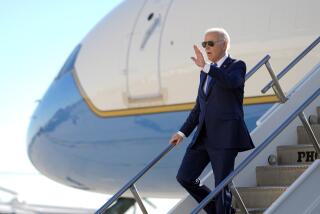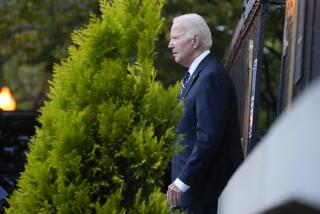Justice Department’s internal watchdog to investigate FBI’s handling of Clinton email inquiry

Comey’s decisions to hold two news conferences and issue letters to Congress about the investigation before the election might have violated Justice Department guidelines.
The Justice Department’s internal watchdog launched a sweeping inquiry Thursday into how the FBI handled its Hillary Clinton email probe, including Director James B. Comey’s controversial decision to publicly discuss the case in ways the former Democratic nominee has complained contributed to her loss.
The inquiry by the Justice Department’s inspector general, likely to keep open the wounds of the bitter 2016 presidential race, will focus on whether “policies or procedures were not followed” by the FBI and Justice Department.
Of particular focus will be the letter sent by Comey to Congress just 11 days before the Nov. 8 election that disclosed that his agents were reviewing newly discovered emails possibly pertinent to the then-closed investigation on Clinton’s handling of classified material while serving as secretary of State.
The disclosure immediately refocused negative public attention on Clinton’s actions. Then Comey made a second surprise announcement a few days later, revealing that the new emails had no impact on the status of the case, which had concluded with no criminal charges.
The FBI director’s statements and a July news conference at which he discussed the details of the case were criticized at various times by members of both political parties as being inappropriate and violating long-standing guidelines that prohibit the public release of information about investigations, especially if such disclosures might affect the outcome of an election.
Comey supporters say he was merely trying to maintain transparency and keep Congress informed under extraordinary circumstances.
But dozens of former federal prosecutors denounced the decision to send a vague letter to Congress before his investigators had adequately reviewed the new information.
Clinton’s campaign blamed Comey’s letters for halting her momentum in the polls and helping in Donald Trump’s victory.
“This is highly encouraging and to be expected given Director Comey’s drastic deviation from Justice Department protocol,” said Brian Fallon, who served as press secretary on the Clinton campaign. “A probe of this sort, however long it takes to conduct, is utterly necessary in order to take the first step to restore the FBI’s reputation as a nonpartisan institution.”
Inspector General Michael E. Horowitz said Thursday that the inquiry was spurred by “numerous” requests for his office to examine the matter.
Such inspector general investigations most often result in reports detailing findings and recommendations, and occasionally a public rebuke. If investigators uncover criminal activity, they may refer matters to the Justice Department for prosecution.
Horowitz, a presidential appointee, does not serve a fixed term and his office operates largely independent of the Justice Department’s leadership, though he reports to the attorney general and can be fired by the president, who must explain such a decision to Congress.
The FBI’s handling of the Clinton investigation came under renewed criticism this week as national security officials testified at a hearing regarding intelligence findings of Russia’s efforts to hack into Democratic Party files in order to embarrass Clinton and help Trump.
Asked about alleged contacts between Russia and Trump allies, Comey said he could not confirm or deny the existence of any FBI inquiry into the matter, especially in a public forum. That brought a sharp rebuke from Sen. Angus King (I-Maine), noting the “irony” of the statement. Clinton supporters similarly complained of an FBI double standard that they said kept any possible Trump-related investigation a secret, but disclosed the details of Clinton’s case.
In a statement Thursday, Comey said he was “grateful” for the inspector general’s review and pledged that “the FBI will cooperate fully with him and his office. I hope very much he is able to share his conclusions and observations with the public because everyone will benefit from thoughtful evaluation and transparency regarding this matter.”
Rob Storch, a spokesman for Horowitz, declined to comment beyond his office’s statement. The inquiry is expected to take at least several months to complete.
Comey’s letters were not the only public disclosures that raised eyebrows among Clinton supporters and will be investigated by the inspector general. Horowitz said his office will also seek to determine whether “improper considerations” influenced the FBI’s publication on its website just days before the election of 15-year-old reports regarding an investigation into President Clinton’s highly controversial decision to pardon fugitive financier Marc Rich.
The Hillary Clinton campaign questioned the timing of the release, though the FBI said at the time it was simply complying with a public information request. The Rich files were released as news organizations were publishing reports on other aspects of the Clinton email investigation and a nascent one into potential problems at the Clinton Foundation, a global charity.
Horowitz said he would examine whether the FBI or Justice Department improperly released information that should have remained private. Democrats were particularly irked by leaks that they said were orchestrated by FBI agents seeking to bolster Trump’s campaign.
“Our citizens must be able to trust that the FBI, our chief federal law enforcement agency, is nonpartisan and does not insert itself into the electoral process,” Reps. John Conyers Jr. (D-Mich.) and Elijah E. Cummings (D-Md.), ranking members of the House Committee on Judiciary and Oversight and Government Reform, said in a statement Thursday. “We are pleased that the inspector general is following up on our request to investigate and review these allegations and look forward to receiving a full review of these matters.”
Another target of the inquiry will be Comey’s top deputy, Andrew McCabe, and whether he should have recused himself from overseeing the Clinton investigation. McCabe’s wife received campaign donations in a 2015 run for state office in Virginia from a political action committee run by a close Clinton ally. Republicans said that McCabe should have stepped aside.
But criticism of the FBI’s handling of the case has focused mostly on whether Comey acted properly in discussing the investigation in public forums, and it will probably be the most consequential aspect of Horowitz’s inquiry.
Comey held a news conference July 5 to announce that he and his agents were recommending that the Justice Department not seek charges against Clinton or her aides for sending and receiving classified information on the private system. The FBI director said agents found no evidence that they had intended to do so, a key element of a potential prosecution. In saying charges were not warranted, however, Comey sharply criticized Clinton and her aides as being “extremely careless” in how they handled classified material.
While Republicans decried Comey’s rationale, Democrats largely hailed his decision to not seek charges. However, the roles reversed on Oct. 28 when Comey sent a bombshell letter to Congress informing lawmakers his agents were reviewing the new emails, discovered on the computer belonging to former Rep. Anthony Weiner, estranged husband of Clinton’s close aide Huma Abedin.
The FBI was investigating whether Weiner may have violated federal laws while exchanging sexually explicit texts with a 15-year-old girl in North Carolina. In examining the computer, the FBI noticed emails related to the Clinton investigation.
But most of the emails turned out to be duplicates or unrelated to the inquiry.
Follow @delwilber on Twitter
ALSO:
Tracking down guns used in crimes and terror attacks is still surprisingly low-tech
Aspiring agents learn from mistakes of FBI’s ‘shameful’ investigation of Martin Luther King Jr.
How these Brooklyn prosecutors work to get innocent convicts out of prison
More to Read
Get the L.A. Times Politics newsletter
Deeply reported insights into legislation, politics and policy from Sacramento, Washington and beyond. In your inbox three times per week.
You may occasionally receive promotional content from the Los Angeles Times.







